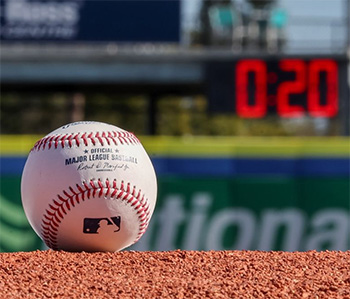Tag: Poscast
Get off my lawn, pitch clock

As I have previously mentioned, I am, shall we say, not a fan of baseball commissioner Rob Manfred. He's terrible. And his new rules imposed on the game, both prior to this year and the new batch in 2023, rankle me. Well, OK, the three-batter minimum for pitchers is fine. But about most of the rest, I am rankled.
Still, this year's batch of changes—the pitch clock, the shift ban, the pickoff limitations—are being met with overwhelmingly positive reaction from people who choose to opine on such things. This also rankles me, but the reasons are more amorphous and vague.
Take Pos and Schur's effusive praise of the new normal. Joe Posnanski and Michael Schur have a podcast ("The Poscast") I find very entertaining (except when they go too long on about non-baseball sports). This week's Poscast was mostly about the new rules and, as Schur put it, he finds them "an unmitigated success." Pos calls the new setup "so awesome" and thinks criticism of it is "insanity." I generally love these guys, but this is…excessive.
They illustrate their position by comparing the pitch-clock setup to the extreme of the previous norm, referring to a side-by-side video someone posted of an entire half-inning of a spring training game from this year alongside a clip of Pedro Baez facing the Cubs in the postseason a few years ago that encompassed a single pitch over the same span of time. Yes, that Pedro Baez example is excessive. That wasn't good and making such an extreme sequence impossible isn't bad in and of itself. But it wasn't a representative AB, it was very much an outlier.
They further cite comparisons to other sports to justify the pitch clock. "Imagine basketball without a shot clock," Schur says. Well, Michael, I don't know or give a damn about basketball. Or football or hockey or any of the other examples he cites. A more frenetic pace might well be appropriate for those games, I don't know. Those sports are not baseball. Baseball is unique. Those arguments mean nothing to me. Eventually he gets back to baseball and makes arguments that mean something, and I respect those, though I disagree with the idea that eliminating the ability of the pitcher to effectively hold a runner is a net good.
Posnanski reminds us that these new rules are a correction, the idea is to return the game to what it was 35, 40, 50 years ago when batters did not step out of the batters' box all the time and pitchers didn't consider his next delivery for a minute before getting into the stretch. And defenses didn't move around the field because of a batter's spray chart that says he never hits to the opposite field. And that, he says, is what we want.
That point I agree with. I do want the game to be played more like it was in the ’80s and ’90s. I just don't like this methodology.
Maybe I'm just a grumpy old man and once I give this a chance I'll be fine with it. Entirely possible. I freely admit that my resistance to accepting the pitch clock and shift ban is tied inextricably to everything else Rob Manfred has done since he took over as commissioner—ads on the field; ads on the uniforms; proscribing who can pitch and who can't; devaluing the season with extra Wild Card playoff slots that are just as good as winning a division; the fucking "zombie runner" in extra innings; and the worst of the worst, the "universal DH"—and giving him even indirect credit for anything feels like having to eat a bowl of moldy nutraloaf. Had Manfred not screwed around so much with these awful things already, I'd likely be closer to Pos and Schur's position.
Yet, having watched some spring training action this year, it does feel rushed. Not frenetic, necessarily, but maybe a little too fast. There is value in having a moment to ponder the next pitch selection for those of us who, you know, pay attention. 15 seconds might be too short a span. When a runner is aboard and the clock extends to 20 seconds it's not bad, that feels proper. It's early days, of course, and it's spring training, but part of the goal for these changes is to create more offense and what I'm seeing is actually more striking out. Batters aren't ready when they swing. That'll change as we move forward, the adjustment period is going to be at least a few weeks of in-game at-bats, but I think 15 might need to be, say, 18 or 20.
Practically speaking, I will not miss the infield shift. I do not like banning it, but batters have unequivocally refused to combat it. In the early days of infield shifts being common, Ken Griffey Jr. would take advantage of it once in a while and bunt to the empty side of the field for an easy hit. Skilled contact hitters could beat it. But that went away, analytics decreed that batters should just keep on trying to pull the ball and hit for power, so defenses started shifting on nearly everybody.
Schur describes the shifting-for-everybody as an "overcorrection" to the steroid era. I see what he means, but I don't like that description at all, because the underlying problem is so many more batters swinging for homers and that hasn't been corrected for at all. Emphasis on power hitting is the underlying problem as regards the infield shift. That plus emphasis on power pitching is the underlying problem behind excessive strikeouts.
Move fences back. Make homers harder to hit and make the outfielders cover more ground—which is also more like things were in the ’80s—and you'll see fewer homers but more singles, doubles, and triples. And when batters (one would hope) stop swinging for the fences all the time, fewer Ks. And less incentive for infield shifts.
The shift ban makes that last bit moot, there's no way that rule is ever going away now that it's in place. We're likely stuck with the pitch clock forever too, and with luck over time it'll fade into the background and not be such a distraction.
But I will campaign until the end of time to do away with the Manfred Man zombie runner and the worst rule of all, the designated hitter.
No Comments yet

